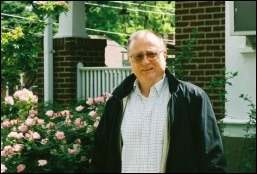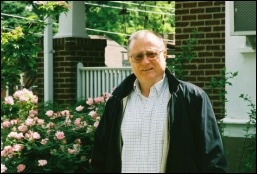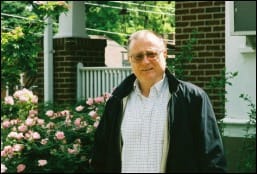 Donal Mahoney, a native of Chicago, lives in St. Louis, Missouri. He has worked as an editor for The Chicago Sun-Times, Loyola University Press and Washington University in St. Louis. His fiction and poetry have appeared in various publications, including The Wisconsin Review, The Kansas Quarterly, The South Carolina Review, The Christian Science Monitor, Commonweal, Guwahatian Magazine (India), The Galway Review (Ireland), Public Republic (Bulgaria), The Osprey Review (Wales), The Istanbul Literary Review (Turkey) and other magazines. Some of his work can be found at http://eyeonlifemag.com/the-poetry-locksmith/donal-mahoney-poet.html#sthash.OSYzpgmQ.dpbs A Modern Fairy Tale: Trumpelstiltskin Trumpelstiltskin is a fairy tale not written by the Brothers Grimm. It’s written every day by Fox and CNN. America hears it every hour and half the nation loves it but the other half hates it. Let’s remember though we Americans will never know what might have been. Had the vote gone otherwise Bill would be in the White House and all the interns on the run. Private server Huma would be grilling wieners for the press. Golly Gee, you say, that sounds like a lot of fun. For Fox and CNN, yes. Not so Hillarious for us. After Services After services on Sunday the old Marlboro man puts his Bible under his arm and talks to his pastor through a hole in his neck. His wife waits in a nice frock and lovely hat and sees smoke coming through his nose. A Poem for Catholics Natural Family Planning has its ups and downs so to speak but it often works quite well. But when the calendar says not tonight I ask my wife to please go in another room with that banana. Bulbs Alive A doctor by day Ralph spends his nights ordering tulip bulbs from Holland beautiful and rare to arrive in autumn to plant and think about for months ahead until spring arrives and the tulips become a rainbow beautiful in his garden. Ralph talks about tulips at the office every day where he pulls small bulbs from the gardens of patients. Unlike his tulips those bulbs don’t grow, never become a rainbow. Twilight Song Sometimes she sits there and listens to him. Sometimes he sits there and listens to her. Sometimes they know what the other will say. Sometimes they surprise each other. As the years go by they say the same things: “I felt it again last night. What do you think?" But they’re careful about what they tell each other. Neither would want to frighten the other. But more often now the key phrase is this: “Should I call the doc now or wait until morning."
0 Comments
 Donal Mahoney, a native of Chicago, lives in St. Louis, Missouri. He has worked as an editor for The Chicago Sun-Times, Loyola University Press and Washington University in St. Louis. His fiction and poetry have appeared in various publications, including The Wisconsin Review, The Kansas Quarterly, The South Carolina Review, The Christian Science Monitor, Commonweal, Guwahatian Magazine (India), The Galway Review (Ireland), Public Republic (Bulgaria), The Osprey Review (Wales), The Istanbul Literary Review (Turkey) and other magazines. Some of his work can be found at http://eyeonlifemag.com/the-poetry-locksmith/donal-mahoney-poet.html#sthash.OSYzpgmQ.dpbs A Gathering of Generations An old man, a poet of the generation of Kerouac, Corso and Ginsburg, is at the lectern tonight in the auditorium of a small college nestled in the Ozarks of Arkansas. Although widely published for many years, both in the United States and abroad, he has never done a reading of his work. He attended a reading once, back in the Fifties. It was held in San Francisco and given by Gregory Corso. All the literati of the day were there, a number of them under the influence of one thing or another. But the reader tonight was so bored he swore he would never do a reading himself. Not one to fraternize with other writers, the poet usually stays home with his African Grey parrots and Scarlet macaws. He writes at an old roll-top desk in what a romantic might call a garret, which he says is just a drafty attic over his old garage, part of an estate he inherited from his parents. He writes, off and on, day and night because he sleeps very little--two hours here, two hours there. He disdains liquor and dope but is a souse when it comes to milkshakes. Tonight his friend of many years, an old professor at a local college, has asked him to read. The professor, almost as old as the poet, assumed the man had read his work often at various venues. The old poet for some reason agreed to do the reading. Maybe the money was attractive, although the honorarium was small. Long ago the poet's four books had been remaindered and now money in any amount helps. Seed for the parrots and macaws adds up. He lives on Social Security and an annuity given to him by his parents long ago because they figured he would never be able to earn a living. They were right. "I can't do a thing other than write verse," he has often admitted. "Maybe a little prose if no poem pops into my mind. Sometimes I find a poem works better as a short story. An editor tipped me off to that not long ago and I make the switch when it's obviously the right thing to do." At the lectern tonight, however, the poet is in his Sunday best--bib overalls and a stovepipe hat set off by a white beard that drops far south of his crotch. He is--as his first and only wife once said--a sight to see but not too often. "I would never have married the man," she said in an article in 1962, "had I any idea of his habits. He can write but that's about it." Many of the students in the audience, almost six decades the poet's junior, have never heard of him nor have they read his work. If they had Googled his name with quotation marks around it, they would probably have been amazed at the number of major journals his poems have appeared in since the Fifties. His work has been published more than a few times with those major writers now remembered as The Beatniks. Most of them are dead now but this man continues to write and publish not only in print but also online. Hundreds of his poems, first published in print years ago, can be found swimming on the web because he sends them out by email when he can't sleep. "Print is in hospice now," he told the professor. "Maybe if I get enough work out on the web, a hundred years from now someone might bump into one of my old poems." The students in the audience are there because the old professor who arranged the reading asked them to attend. Besides there are other professors in the front row the students want to impress. Could be the difference between an A-minus or a B-plus. After being introduced by the professor, the old poet begins to read in a voice laryngitis would enhance. Since the students do not have a copy of his poems in front of them, they can't follow him and they remain unimpressed. Some nod off as the hour wears on. At the end of the reading, the reader says he understands that many students in the audience write poetry and he wants to tell them something someone told him when he was young and new to writing poetry. Clearing his throat, he removes his stovepipe hat, leans into the microphone and says in a loud, clear voice absent during his reading: "A noun is nothing more than a limousine waiting for the right verb to drive it where it needs to go. Without the right verb the noun goes nowhere. "Adjectives and adverbs are dead weight, unnecessary freight, a drag on fuel economy, an impediment to any poem in gestation or out and about as an adult. "Worse, adjectives and adverbs are cyanide ingested to any writer hoping to create art. "The secret, if there is one, is to write the first draft of a poem and then dive back into the text like a surgeon and excise adjectives and adverbs no matter how much you want them to stay there. "Next, replace any impotent verb with one that has muscle, a verb that can move its noun forward until the noun ahead of it is almost forced off the page. "Remember, a poem is not an essay for rhetoric class or a report in a newspaper. A poem is a living thing. The first draft is a fetus no one should abort. You should work on that draft nine months if you have to and then bring it to term." When the old man finished speaking, applause broke out among students and faculty alike. The poet bowed and smiled. And then he moved back from the microphone, put on his stovepipe hat, turned his wheel chair around and rode off the stage. On this night he would have two milkshakes before going home to feed his parrots and macaws.  Donal Mahoney, a native of Chicago, lives in St. Louis, Missouri. He has worked as an editor for The Chicago Sun-Times, Loyola University Press and Washington University in St. Louis. His fiction and poetry have appeared in various publications, including The Wisconsin Review, The Kansas Quarterly, The South Carolina Review, The Christian Science Monitor, Commonweal, Guwahatian Magazine (India), The Galway Review (Ireland), Public Republic (Bulgaria), The Osprey Review (Wales), The Istanbul Literary Review (Turkey) and other magazines. Some of his work can be found at http://eyeonlifemag.com/the-poetry-locksmith/donal-mahoney-poet.html#sthash.OSYzpgmQ.dpbs New Year's Resolutions Jim Daley and Joe McCarthy had something in common. They died at 80 going to the bathroom in the middle of the night. Walt O'Brien, their protege, found this out when he called the homes of both men on New Year's Day, an annual custom for Walt, something he started doing years ago just to find out how his old mentors were doing. Jim's widow spoke to Walt on the phone and told him Jim had died from a stroke on Halloween. They had found his body in the morning, half in the bathroom and half in the hallway, cold as a mackerel fresh out of the sea. Jim's widow said she was a sound sleeper. Walt thought she should have heard his body fall since Jim was a big man, all belly and buttocks, as Jim himself would put it. Joe's widow said her Joe had tripped on the bathroom rug on All Soul's Day, banged his head on the commode and died in intensive care a week later, never emerging from his coma. She was happy the priest got there in time to administer the last rites before Joe stopped breathing. His last breath, she said, was a gurgle. Jim and Joe had been more like uncles to Walt than mentors. They came into his life when Walt was in grammar school. It was just after his dad had been killed in Korea and Walt needed all the support he could get. Over the next 50 years Walt had stayed in touch with both men, calling them on New Year's Day from different cities. Their advice over the years helped Walt survive three job losses, a foreclosure, two car wrecks and four divorces. Sometimes their advice dealt with the big issues of life. But sometimes they commented on smaller phenomena as well. Last year, for example, Jim had warned Walt that growing old meant not being able to put your underwear on standing up. "I have to sit on the bed now," Jim had said, sounding almost depressed for a man known for his jocularity. Right after Jim told him about the underwear problem, Walt called Joe and asked if Jim was right. Joe too confirmed he now had to sit on the bed to get his underwear on. He told Walt every man has to sit down at some point in life, provided he lives long enough. "Age has its requirements," Joe said. "There's a happy medium, I suppose. If I had died a few years ago, I wouldn't be having this problem right now." At 60, Walt could still put his underwear on standing up but it was getting more difficult. He had to hop on one leg, pogo-stick style, to get the job done. But sitting down was not an option. Walt was a proud man who had overcome bigger problems in life and he'd keep hopping for as long as he could. One time, however, he almost fell but landed in a chair. His fourth wife Belinda still laughs about it even though they're no longer married. She even called two of his ex-wives and told them about it. They couldn't stop laughing. Walt knows that one day he will have to sit down to put his underwear on unless he dies before that. He figures he has at least a few good years left. But after hearing that Jim and Joe had died trying to get to the bathroom in the middle of the night, Walt decided to take certain steps to avoid a similar mishap in his own life. First, he installed night lights along the baseboards going from the bedroom to the bathroom. At midnight the hallway now shines like a small expressway with no traffic at all. Then Walt made some New Year's resolutions, a step he had never taken before. As a result he now eats salads and fruit plates instead of double cheeseburgers and lots of ice cream. What's more he reads the Bible now and then in the morning. He's even quit drinking beer late into the night. The new Walt now sits back in his leather recliner, sips wine coolers out of old jelly jars and listens, over and over, to his favorite recording of an old Irish reel called "Toss the Feathers." It’s played beautifully, he says, by the McNulty Family, most of whose members, he figures, are by now dead. When he was a boy, Jim and Joe had introduced Walt to traditional Irish music and even taught him a few steps of the reel, jig and hornpipe. Once in awhile, when he's had enough wine, Walt tries to do a few of those steps and he succeeds to his own satisfaction. And, of course, he still puts his underwear on standing up, one hop at a time. |
ArchivesCategories
All
|
 RSS Feed
RSS Feed